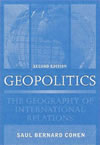Introducing Saul Cohen
 Professor Saul Cohen is University Professor Emeritus at Hunter College and the City University of New York. He is also Editor of the Oxford World Atlas, among other positions. Professor Cohen obtained his PhD at Harvard University and is specialised in geopolitical theory and political geography. He has written extensively about political and economic geography, Israel and Middle East geography, education and environmental perception. In 2008, the second edition of his book “Geopolitics: the Geography of International Relations” was published.
Professor Saul Cohen is University Professor Emeritus at Hunter College and the City University of New York. He is also Editor of the Oxford World Atlas, among other positions. Professor Cohen obtained his PhD at Harvard University and is specialised in geopolitical theory and political geography. He has written extensively about political and economic geography, Israel and Middle East geography, education and environmental perception. In 2008, the second edition of his book “Geopolitics: the Geography of International Relations” was published.
Like last year, Saul Cohen contributes to the Geopolitical Review 2012. He focuses on key geopolitical trends in various regions and relate these to US foreign policy.
Another contribution to this Geopolitical Review is Andrea Teti: 2012 – The Arab Spring in Egypt: From Uprising to Revolution?
Geopolitical Review
United States no longer the world’s leading superpower
The year 2012 provided additional confirmation that the United States was no longer the world’s leading superpower. Nor for that matter, was any other Great Power predominant in this polycentric world.
During the presidential campaign, Mitt Romney promised the American people that he would restore the country to its former preeminence. However, ongoing geopolitical events, as well as those of the past few years, demonstrated that this possibility was rhetoric and not reality. Washington had neither the surplus energy nor the appetite to regain its former role as the global policeman.
The year 2011 was marked by the convergence of events that confirmed the end of America’s role as the world’s dominant power. Even though a multipolar geopolitical world had emerged by the onset of the 21st century, the George W. Bush administration continued to behave as though it were still the global hegemon. It plunged into wars in Afghanistan and Iraq while lowering taxes and without a long term occupation strategy.
Lulled by the rapid success of the 1991 Gulf War, Washington was convinced of the invulnerability of its armed forces. Consequently it placed the burden of fighting upon volunteers and contractors, rather than adopting universal military service.
In 2012, the United States took only a minor role in the various international efforts to support the Syrian rebels in their efforts to overthrow Bashar al-Assad, leaving this to Turkey, Qatar, France, Britain and the international community. It also failed to secure Russian agreement to join in this effort.
When Israel announced that it would build a total of 9,000 housing units in the West Bank and East Jerusalem, the Obama administration could only characterize the move as ‘unhelpful’, despite US commitment to a two-state solution. Washington has left the initiative to Europe to exert pressure on Israel by threatening trade restrictions.
In Iraq the United States had little success in persuading the Shiite-dominated government, which it had sponsored and financed, from prohibiting air craft over-flights carrying arms to Syria. Washington also unfroze relations with Pakistan, accepting Islamabad’s tolerance of Taliban use of North Waziristan as a safe haven, in exchange for Pakistan reopening the American military supply route from Karachi through the Khyber Pass to Afghanistan.
While rebalancing US military forces to reinforce its treaty commitments to the nations of the Asia-Pacific Rim, Washington did not challenge China directly, but sought to engage Beijing in softening its verbal threats and aggressive naval moves in the East and South China Seas.
All of the above reflect the Obama administration commitment to use of ‘soft’ economic and diplomatic rather than ‘hard’ military power. This includes seeking partnerships with other major and regional states in attaining its geopolitical objectives.
Decline of the Atlantic Alliance Economy
US policy in 2012 was heavily influenced by overriding concerns with domestic economic weakness and the political chasm between Democrats and Republicans as to how they should be addressed. While the nation’s GDP did improve modestly during the year, the national debt increase was double that of the GDP rise. Thus American economic progress continued to depend on unsustainable borrowing. More broadly, the dysfunctional state of the US Congress and its confrontational relations with the administration brought to a standstill possible changes in both domestic and foreign policy.
In Europe, the fiscal crisis was more extreme. Within the Eurozone, a deep schism arose between its northern and southern members. The stagnation of the European economy made a major impact upon political, as well as economic relations, both within the Zone and the European Union as a whole. This was exacerbated by the rise of Euro-skepticism within the U.K.’s Conservative Party, leading to some of its key members to call for Britain to opt out of the EU.
Although the economies of the United States and Europe are so closely intertwined, much of the year was spent on finger pointing by each side to the flawed policies of the other. No effort was made to address the fiscal crisis as a trans-Atlantic one which could be eased through free trade agreements, harmonizing banking regulations and rationalizing defense expenditures.
Shifting Alliances within the Middle East Shatterbelt
The rise to power of Islamic parties in Egypt, Tunisia and, potentially, Syria, is a harbinger of the loss of Western, and especially American, influence within the region. It also presages a regional schism between a Shiite bloc of Iran and Iraq, and a Sunni bloc that includes Egypt, Sudan, Tunisia, Libya, Jordan, Saudi Arabia and the United Arab Emirates. Caught between the two are Bahrain and Kuwait, both of whose respectively Shiite majority and considerable Shiite minority populations are ruled by Sunni monarchs.
Syria also has become a battleground between its majority Sunni population that has risen in revolt against the Shia Alawite Assad regime. Shiite minorities in north Yemen and south Lebanon, and Sunni minorities in western Iraq are also sources of major civil unrest. The Kurds in Iraq and Syria also threaten to destabilize the region, especially in view of their relations with the Kurds of Turkey. In addition, Ankara has made agreements with the Kurdish leadership in Iraq to invest heavily in the oil fields of Kirkuk, and to rebuild the Kirkuk-Ceyhan pipeline. This is likely to bring Turkey into contention with the Shia government in Bagdad.
Turkey aspired to become the leader and peacemaker of the Middle East. It failed in this effort because of both Egypt’s rise and its own entanglement in Syria. The odds are that this failure will prompt Ankara to renew its efforts to join the European Union.
US Energy Independence Progress
In 2012, the US made rapid strides toward gaining energy self-sufficiency. Energy independence within five years has been forecast with the hydrofracking in the continental US of shale rock containing natural gas and oil, and intensified off-shore drilling in the Gulf of Mexico. Natural gas from fracked shale already supplies half of all US gas consumption. The rapid increase in supply has driven prices to all-time lows, stimulating the replacement of coal in retrofitted electric energy plants. So vast is the potential of shale gas that liquefied natural gas plants (LNG) are already being built along the Gulf coast to export the product. Oil production has also increased rapidly, satisfying 40% of all oil requirements in 2012.
The forecast for US self-sufficiency is based not only on oil and gas increases, but also on alternative energy sources and greater fuel efficiency. Whether or not this goal is reached within the five year forecast, America will no longer have any need to import oil from the Middle East. Canada, Mexico, Brazil, Venezuela and West Africa have more than ample capacity to fill US needs. This, along with the overthrow of established governments, will hasten America’s shift of interest away from the region in which it has had such strong influence. The implications are especially profound for Israel and for Saudi Arabia and the Gulf States.
